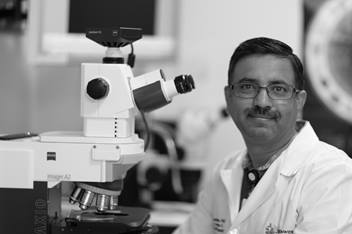Garg Lab
The Garg Lab investigates the genetic foundations of congenital heart disease (CHD), the most common birth defect. Led by Dr. Garg, the team explores how genetic mutations disrupt cardiac development, contributing to both CHD and related adult-onset cardiovascular conditions. Their pioneering work identified key genes like GATA4 and NOTCH1 in heart defects and valve disease, and continues to evolve with cutting-edge genomic technologies such as exome and whole genome sequencing. The lab also examines gene-environment interactions, including the impact of maternal diabetes on heart development, using advanced cellular and animal models. Supported by major institutions like the NIH and AHA, the Garg Lab has trained over 50 diverse researchers and remains at the forefront of cardiovascular genetics research.
Featured Publications
- Distribution of Notch1 and Gata5 in Mice Leads to Congenital Aortic Valve Disease
- Expression of Netrin-1 in the Developing Mouse Heart
- Impact of Genetic Factors on Antioxidant Rescue of Maternal Diabetes-Associated Congenital Heart Disease
- Novel Pathogenic GATA6 Variant Associated with Congenital Heart Disease, Diabetes Mellitus and Necrotizing Enterocolitis
- Generation and Characterization of a Human Induced Pluripotent Stem Cell Line Heterozygous for a NOTCH1 Mutation (NCHio14-A)
Our Research
The Garg Lab focuses on identifying genetic contributors to the most common type of birth defect: congenital heart diseases (CHD). Its team aims to dissect the molecular mechanisms by which these genetic abnormalities disrupt cardiac developmental pathways to cause cardiovascular disease. The Garg Lab is also interested in the genetic contributors to progressive heart valve and aortic aneurysmal diseases, which often affect CHD survivors.
Dr. Garg and his team have studied families with inherited cardiovascular diseases, including CHD, cardiomyopathies and cardiac arrhythmias, to identify novel etiologic genes and/or pathogenic variants and published the first research linking mutations in GATA4 and NOTCH1 to cardiac septation defects and heart valve disease, respectively, in humans (Garg, Nature 2003; Garg, Nature, 2005).
Over time, research in the Garg Lab has evolved to leverage the latest advances in genomic technologies, including chromosomal microarray and, more recently, exome and whole genome sequencing approaches (LaHaye, Circulation: Cardiovascular Genetics 2016; Manivannan, PLOS Genetics 2020). His team was also one of the first to identify pathogenic chromosomal copy number changes in children with CHD and additional congenital anomalies (Richards, Pediatric Research 2008).
The Garg Lab has since studied how these genes and specific mutations disrupt normal heart development and gene functions, respectively, by using cell-based assays and, in select cases, the development of murine models (Misra, PLOS Genetics, 2012; Koenig, Journal of the American Heart Association, 2016; LaHaye, Disease Models & Mechanisms, 2019; Yasuhara, JACC Basic to Translational Science, 2025). This work has led to insights into the etiology of both congenital heart defects and adult-onset cardiovascular diseases, which are often co-morbid conditions for adult congenital heart disease survivors (Koenig, JCI Insight 2017; Majumdar, Science Advances, 2021).
Additionally, to further define the role of gene-environment interactions in CHD, the team has expanded its research to include efforts to better understand how environmental factors, specifically maternal diabetes, affect cardiac developmental pathways using both mouse and induced pluripotent stem cell models (Basu, JCI Insight, 2017; Choudhury, JCI Insight, 2024).
The research efforts in the Garg Lab have involved a diverse group of over 50 trainees, ranging from postdoctoral and research fellows with both medical and doctorate degrees, graduate and medical students and undergraduate and high school students. Support for the lab’s research efforts includes current and past extramural funding from the National Institutes of Health (NIH) National Heart, Lung and Blood Institute (NHLBI), American Heart Association (AHA), Additional Ventures, March of Dimes, Children’s Heart Foundation and Saving tiny Hearts Society.
Ongoing Research Support
| Funding | Research | Years Awarded |
| R01HL144009 | Epigenetic Mechanisms Underlying Maternal Diabetes Associated Cardiac Malformations | 2019-2025 |
| R01HL165124 | The Role of Notch Signaling in Type 2 Diabetic Coronary Microvascular Disease |
2025-2027 |
| R01HL175924 | Mechanisms and therapeutics for congenital aortic valve disease | 2024-2028 |
Join Our Team!
The Garg Lab is growing. If you are interested in joining our team as a gap year trainee, research intern, research assistant, etc., please send a cover letter and a CV/Resume to Vidu.Garg@NationwideChildrens.org.



